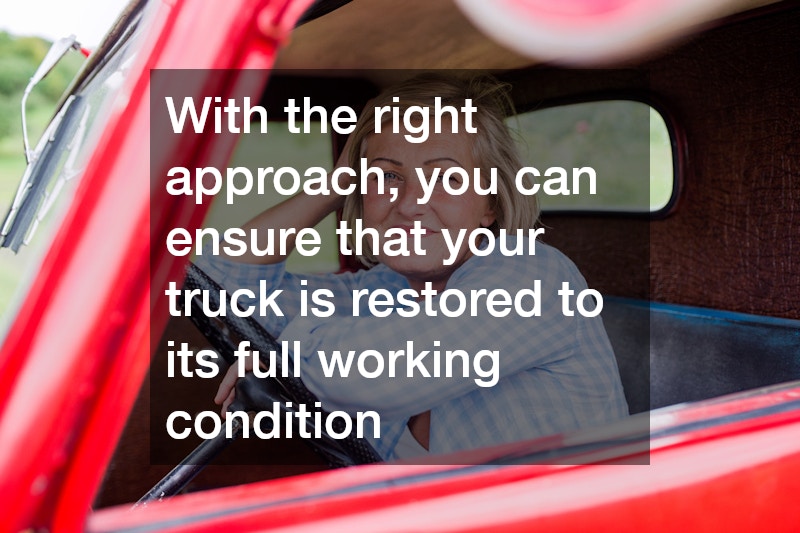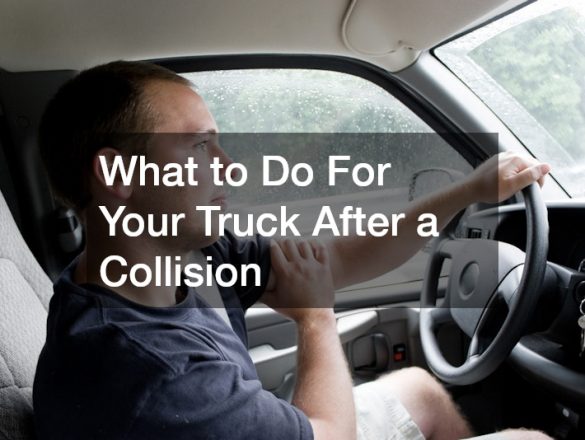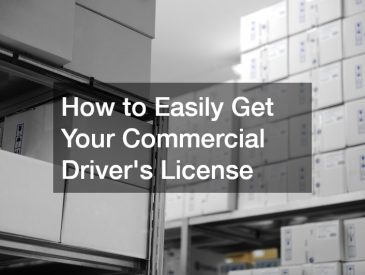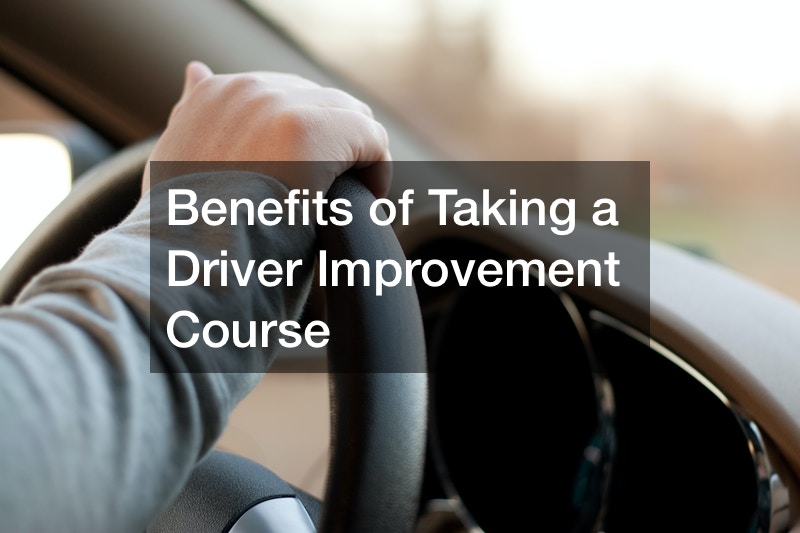
Collisions are stressful events, and dealing with the aftermath can feel overwhelming. When your truck is involved in an accident, the steps you take next will influence the extent of the damage and the speed of its repair. From assessing the damage to contacting your insurance company and selecting the right professionals for repairs, understanding the process can help you navigate this challenging time. Here’s what to do for your truck after a collision to ensure it gets back on the road safely.
Step 1: Ensure Safety First
The first priority after any accident is ensuring everyone’s safety. If you’re physically able to do so, check yourself and any passengers for injuries. If it’s safe, move your truck out of traffic and turn on your hazard lights. This minimizes the risk of further accidents. If necessary, call emergency services to report the collision and get immediate medical help if anyone is injured.
Step 2: Call Your Insurance Company
Once safety is confirmed, contact your auto insurance company to report the accident. Having an active auto insurance plan is crucial because it helps cover the cost of repairs. Your insurer will guide you through the claims process, tell you how to proceed with the assessment of damages, and provide you with recommendations for repair shops.
When speaking to your insurance representative, make sure to take note of any claim number they provide. This will be necessary for any future correspondence regarding the accident.
Step 3: Assess the Damage to Your Truck
After ensuring that everyone is safe and your insurance has been contacted, you’ll want to assess the damage to your truck. Depending on the severity of the collision, the damage can range from minor scratches to severe structural issues.
If the damage appears minor, like a dented bumper or a scratched door, it might be manageable with simple repairs. However, for more significant damage, such as issues with the frame, engine, or transmission, it’s important to get the vehicle inspected by a professional. In these cases, diesel truck repair specialists or a local auto body service should be called in to assess the extent of the damage and determine whether any structural components need to be replaced.
Step 4: Get a Professional Vehicle Inspection
It’s always wise to have your truck inspected by professionals after a collision, even if the damage seems minimal. Local auto body services are equipped to carry out a thorough inspection to identify hidden issues that might not be immediately visible. For example, frame damage can be difficult to detect, but it could cause long-term issues if left untreated.
Local auto mechanics can also help assess the engine, exhaust, and other essential components of your truck. Sometimes, exhaust services may be required to fix issues caused by the collision. If your truck’s exhaust system has been compromised, it can affect the vehicle’s performance and fuel efficiency. Addressing these problems quickly can prevent further issues down the line.
Step 5: Choose the Right Auto Body Service
After the inspection, your next step is selecting an auto body service that specializes in truck repairs. You’ll want to find a service with experience in repairing trucks, as they have specialized equipment for handling larger vehicles. Whether it’s frame straightening or replacing panels, auto body services are skilled in restoring your truck to its original state.
If your truck has extensive damage, it’s important to choose a service that offers a range of services, including paint jobs and part replacements. The goal is to find a provider who can return your truck to the road looking as good as new. For some vehicles, like BMWs, specific providers may offer specialized BMW repairs to ensure your truck gets the attention it needs.
Step 6: Consider Exhaust Services
When your truck has been in a collision, it’s not uncommon for the exhaust system to suffer damage. A malfunctioning exhaust system can negatively affect the engine’s performance and fuel efficiency. If your exhaust system has been compromised, you should seek expert exhaust services. These professionals will inspect the exhaust pipes, mufflers, and other components to make necessary repairs or replacements.
Exhaust system issues might not always be immediately apparent, but a damaged system can contribute to engine misfires, decreased fuel efficiency, or excessive noise. To avoid these long-term problems, it’s best to address exhaust repairs as soon as possible.
Step 7: Get Brake Repairs or a Brake Service Inspection
Accidents can cause your truck’s braking system to become damaged or misaligned. Since brakes are critical for your truck’s safety, it’s essential to ensure they’re in working order before getting back on the road. A brake shop can perform a detailed inspection to make sure your truck’s brakes are functioning properly.
If the collision caused any brake fluid leaks or problems with the rotors or pads, brake shop professionals will take care of it quickly. It’s not just about having brakes that work but having them perform to the highest standards of safety.
Step 8: Repairing Your Truck’s Interior and Exterior
While many collisions result in damage to the truck’s exterior, such as dents, scratches, or shattered windows, the interior can also sustain damage. Whether it’s from airbags deploying, debris inside the cabin, or even something as simple as a broken window, it’s crucial to have everything checked. Local auto body services can handle repairs on both the interior and exterior, ensuring that the truck is fully restored.
In some cases, especially after a serious collision, your truck may need additional services such as upholstery or dashboard repairs. Don’t hesitate to reach out to professionals who can help with everything, from replacing broken glass to repairing seats or steering columns.
Step 9: Plan for RV Collision Repairs (If Applicable)
If you were involved in an RV collision or if you were driving a truck towing an RV during the accident, you’ll need to factor in RV collision repairs as well. RVs, especially large ones, have complex structures that require specialized knowledge for repairs. If you’re involved in an RV collision, it’s important to work with a provider that specializes in RV repairs and restoration.
Since RVs have different components than trucks, they require expertise in everything from the body and frame to the interior and electrical systems. Finding a shop that offers RV collision repairs can save you time and hassle, ensuring your RV is properly repaired and ready for future use.
Step 10: Address Any Locksmith Needs
During a collision, it’s possible for the vehicle’s locks to get damaged or malfunction. Whether the truck’s keys were lost, or the lock system is compromised, auto locksmiths can come in and help replace or repair the locks. Locksmiths can also help you with lost keys or broken ignition switches, ensuring that your truck is secure and can be operated properly once it’s repaired.
Step 11: Follow Up on Repairs and Get a Post-Collision Vehicle Inspection
Once the repairs have been made, it’s crucial to schedule a final inspection to make sure everything has been properly fixed. A post-collision vehicle inspection will ensure that all parts, both visible and hidden, are functioning as they should. This includes checking for issues like alignment, exhaust system repairs, brake safety, and electrical problems.
In some cases, you may also want to have the truck re-inspected by a different mechanic or repair shop for a second opinion. This is particularly important if the truck is a diesel-powered vehicle, as diesel trucks can sometimes require more attention to the finer details of the engine and fuel system after a collision.
Step 12: Understand the Costs and Payment Process
After the repairs are completed, understanding the financial aspects of the repair process is essential. Some costs may be covered by your insurance, but there could still be out-of-pocket expenses depending on your policy and deductible. If repairs were extensive, costs could add up quickly, especially if you’re dealing with an RV collision or if specialized services like exhaust services or diesel truck repair were needed.
To make sure the repair process stays within your budget, be sure to get a detailed estimate from your auto body service, brake shop, or local auto mechanic. Review your auto insurance plan to see what’s covered and discuss the payment options with the repair shop.
Dealing with a truck collision is never easy, but with the right approach, you can ensure that your truck is restored to its full working condition. Whether it’s through diesel truck repair, exhaust services, brake repair, or even working with auto locksmiths, there are professionals ready to help you. The key is to remain proactive in getting the right services and ensuring that all issues, from the engine to the exterior, are taken care of. Taking these steps will get your truck back on the road, safer and stronger than before.




